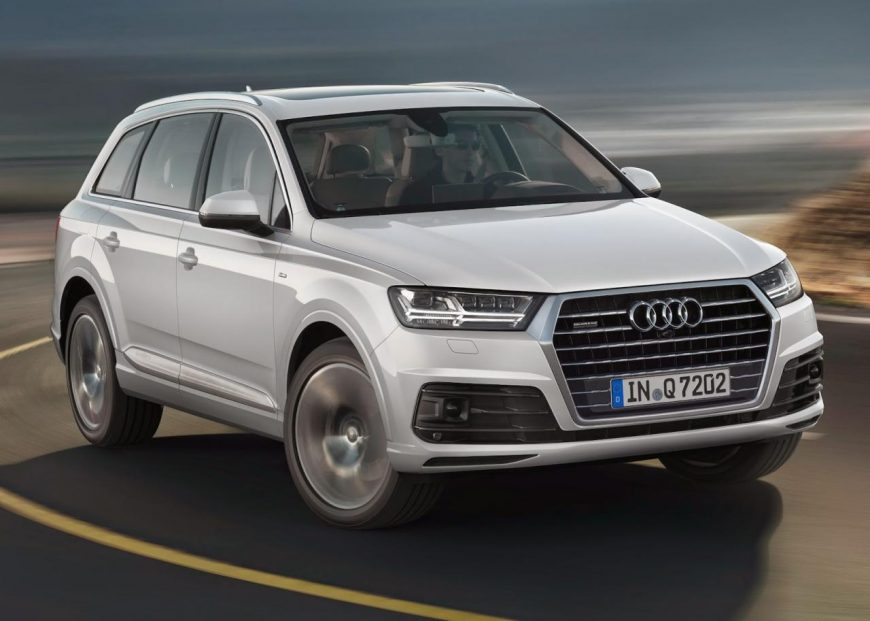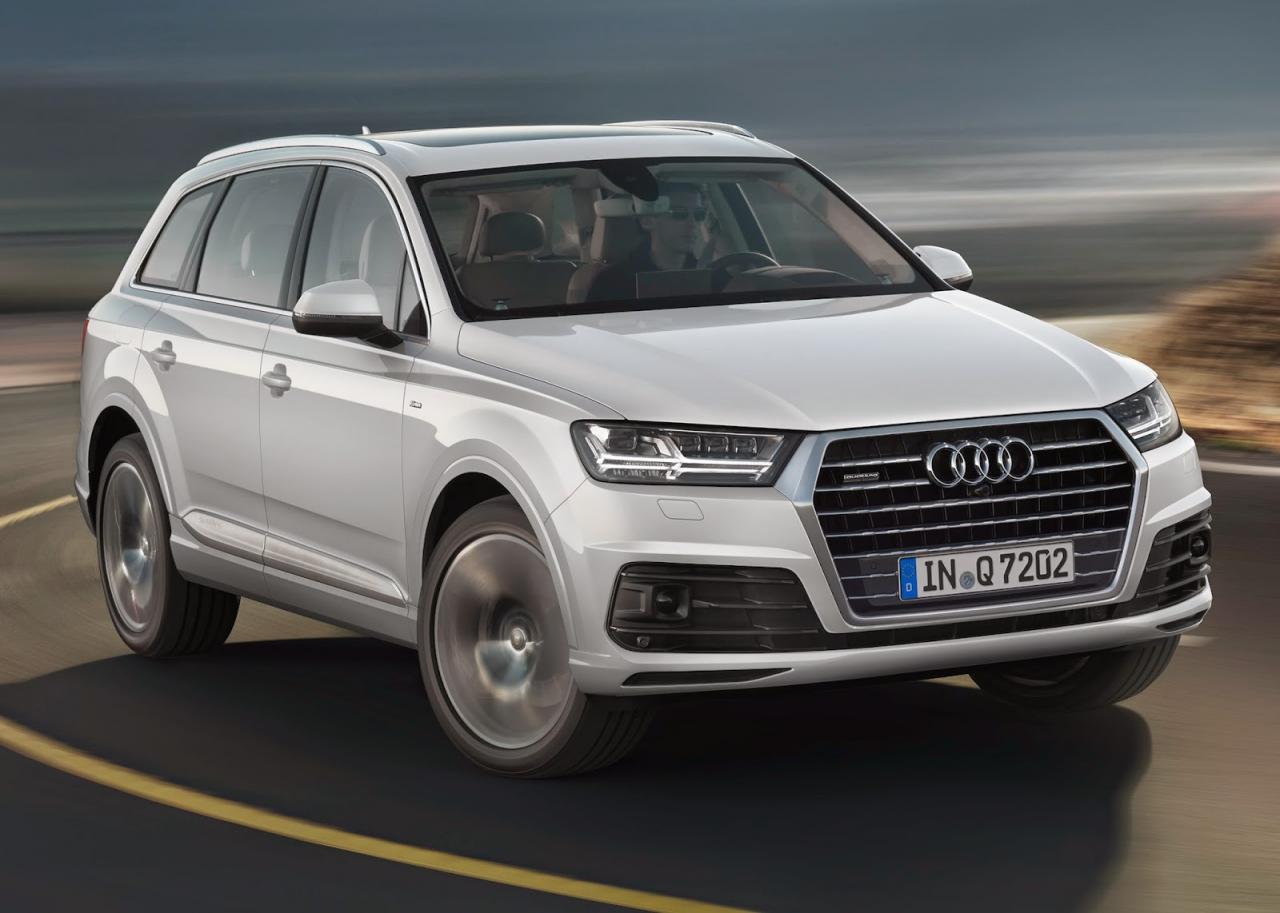
The Audi Q7 is one of the most attractive luxury SUVs in the market. The Audi Q7 renowned popularity is attributed to its top notch quality and performance. The German automaker’s first SUV continues to offer a practical interior, state of the art features, sophisticated luxury features and the latest safety features. The Q7 is the large Audi for sporty individualists, for people who are seeking a vehicle that will take them anywhere they want to go for sports, recreation, and business. Its dynamic proportions and distinctive lines express this character, and subtle modifications endow its styling with even more elegance. For 2015 the Audi Q7 gets a redesigned look, plenty of features and a 325 kg slimpossible treatment.
 |
| Audi Q7 |
Design
The second generation Audi Q7 features slightly smaller proportions compared to the outgoing model. However, the interior space has increased improving overall passenger comfort and storage space. The design of the new Q7 is masculine and determined. Horizontal lines extend above the wheels. The exterior mirrors are mounted on the shoulders of the doors. Bellow the side mirrors are silver blades, which run from the front to the rear doors. The blades bear embossed Quattro logos at the rear doors. The boot door wraps around the massive, steeply raked D-pillars, a typical feature of the Q models from Audi.
 |
| Striking profile |
The Singleframe grille is deeply sculpted and features thick crossbars. It is integrated organically into the front end. Its broad frame extends to the headlights, which feature either xenon, LED or Matrix LED technology, depending on the option chosen by the customer. The daytime running lights of the LED headlights are shaped like a double arrow. The taillights of the top model include dynamic turn signals that were first introduced on the Audi R8. The new Audi Q7 comes standard with 18-inch wheels and 235/65 tires. A large number of additional wheels in sizes up to 21 inches are also available.
 |
| Stylish gear stick with integrated electric parking |
Performance
The Audi Q7 is available with two V6 engines. Others will be introduced at a later date. The petrol (TFSI) and diesel (TDI) V6 have been refined to be more efficient while delivering more power. The powerful 3.0 TDI produces 200 kW (272 hp) and 600 Nm of torque. The sprint from 0 to 100 km/h takes 6.3 seconds while top speed is 234 km/h. Average fuel consumption is just 5.7 litres per 100 kilometres. The 3.0 TFSI produces 245 kW (333 hp) and 440 Nm of torque, accelerating the big SUV from 0 to 100 km/h in 6.1 seconds on its way to a top speed of 250 km/h. Fuel consumption is recorded at 7.7 litres per 100 km. A newly developed, eight-speed tiptronic transfers the engine’s power to the Quattro permanent all-wheel drive system.
Besides automatic mode, the driver can also choose to control the tiptronic using the standard paddles on the steering wheel or via a selector lever. Both the front and rear axle are five-link designs, replacing the double wishbone axles of the previous model. The new adaptive air suspension rewards the new Audi Q7 better control, less rolling and more riding comfort. The hydraulic steering is replaced by a new electromechanical power steering whose boost decreases as speed increases. Large, vented brake discs bring the SUV safely to a stop. The new Q7’s high ground clearance of up to 235 millimetres (9.3 in) and large axle articulation allow it to tackle any terrain with ease.
 |
| Cockpit |
Interior
The new Audi Q7 welcomes its occupants with an atmosphere of cultivated elegance and spaciousness. The dashboard seems to run from the doors to the instrument panel. This creates a wrap-around effect on the front occupants. All buttons and controls are tailored specifically to the Audi Q7. They are located on the centre console, which is oriented toward the driver. The shapes and contours of the buttons and controls harmonize well with the interior architecture.
 |
| Audi tablet |
Behind the steering wheel is a 7-inch colour display that functions as the Q7’s instrument cluster. The screen also displays the current radio station, location and other vehicle functions. The Audi Q7’s infotainment system consists of a large 12.3-inch screen paired with a 23-speaker Bang & Olufsen system that delivers 1,920 watts of amplifier power.
 |
| Rear seats |
One or optionally two Audi tablets with 10.1 inch screens and a fine finish serve as rear seat monitors. The Audi tablet features a full HD camera, 32 GB of internal storage and an additional Bluetooth and NFC interface for connecting headphones. LED ambient lighting adds a calming and sophisticated touch to the interior. With the longest cabin in its class despite shorter exterior length, the new Audi Q7 offers more space than its predecessor. Passengers enjoy more head, shoulder and knee room. The new Q7 is available as either a five seater or seven seater. The seven-seater version features 295 litres with all seats up. The five-seater version comes with 890 litres and 2,075 litres (with the second row seat backs folded down. A self-opening and closing boot door is offered as standard.
 |
| Rear design with distinct LED lights |
Verdict
Audi’s biggest SUV continues to offer to offer the best in luxury, comfort, safety and refinement. Although the design tweaks appear minimalistic they have certainly had a great impact on the overall look of the Audi Q7. The interior is equally improved offering the very latest in infotainment technology and improved interior comfort. The Audi Q7 goes on sale from spring 2015 in Europe.
